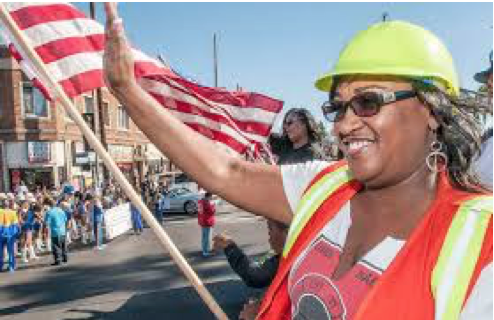Comments
GUEST WORDS--There's no one kind of worker in America, just like as there's no one way to work. As digital technologies and artificial intelligence expand our collective capacity to get things done, our attention has turned to the idea of work itself: its stipulations, its historic inequalities, and even its emergence as apolitical position. Considering the future of the American worker means considering questions of workplace inclusivity, diversity, and automation.
While commemorating the end of summer with some BBQ meat marinated in beer, take a gander at some recent Pacific Standard stories that put into perspective what it means to be a worker in 2017.
There's a Strategy That Helps Prevent Injuries at Work. Why Isn't the Federal Government Using It?
The Occupational Safety and Health Administration has altered its strategies dramatically since Donald Trump became president. What does that mean for America's workers?
What's Good (and Bad) About the U.S. Economy
The jobs gap is finally closed. But there are still some glaring weaknesses in the economy. While the employment gap for workers with college and graduate degrees has been closed for some time now, workers without a college degree still have quite a bit of ground to make up.
New Evidence That Selling Clothes on Facebook May Not Be Such a Great Gig
Why do so many women love selling to their friends? Last December,Pacific Standard spoke with joiners of a buzzy new multilevel clothing company, LuLaRoe, which sells branded shirts, skirts, dresses, and leggings via "consultants," or people who have signed up to push their products. In the process, we tried to answer why American women are disproportionately likely to join multilevel marketing businesses, in which members earn commission from new members they recruit. LuLaRoe is just one of a new crop of such companies.
The Absence of Valuing Unpaid Care Work
The gross domestic product attempts to measure the market value of all final goods and services produced in an economy, like personal expenses on food and rent, government spending, and investments. It doesn't, however, measure the beneficial but uncompensated work done within households. On a typical day, more than a quarter of Americans provide unpaid care work in the form of parenting or caring for a sick or aging relative. This work is indispensable to the individuals cared for, and it frees up the resources that power the paid economy.
A Brief History of the Coffee Shop as a Symbol for Gentrification
Despite the popular narrative that exists, scholars remain divided over whether coffee shops can actually usher in a class shift in a neighborhood, or whether high-end coffee shops follow in the wake of an uptick in housing prices. Nevertheless, there's a long history of coffee shops accompanying an influx of middle-class people and tastes into poorer neighborhoods. Witness the recent attacks on a Boyle Heights coffee shop.
New research suggests that spending cash can indeed bolster life satisfaction—if the end result is more free time. Such purchases can provide a buffer against "time famine," which in turn promotes happiness, reports a research team led by Ashley Whillans of Harvard Business School. "Spending money to buy free time," the researchers write, is a "previously unexamined route from wealth to well-being."
Yes, Robots Are Coming for Our Jobs. They've Been Coming for a While.
In recent years, more than a few economists, politicians, and Silicon Valley entrepreneurs have expressed concerns about the coming "robot revolution." In fact, one of the major arguments in favor of a universal basic income is that the robots are coming for all of our jobs. It's subject to debate exactly how far the potential effects of this revolution will trickle, but some economists estimate that up to 47 percent of American workers are at risk of losing their jobs due to automation. The World Bank puts that number closer to 57 percent.
One Top Economist Weighs in on How We Can Bring Back the American Dream
Economist Richard Reeves' most recent book proposes a number of reforms that could return America to a country of equal opportunity. Some of those reforms, like providing better access to child-rearing programs for low-income parents, are designed to level the socioeconomic playing field. Others, such as the elimination of legacy preferences in college admissions, would require upper-middle-class Americans to, in Reeves' words, "make some modest sacrifices in order to expand opportunities for others."
(Varun Nayar is the Web producer at Pacific Standard, where he oversees editorial and social strategy for PSmag.com.)















